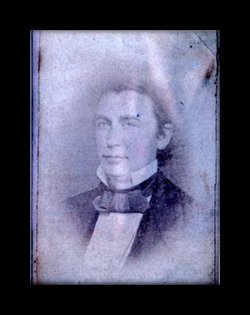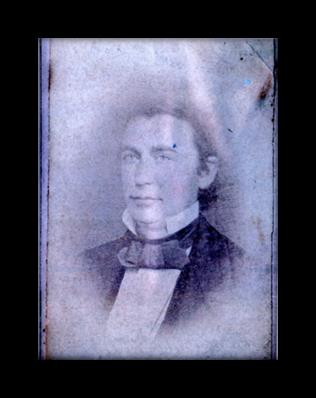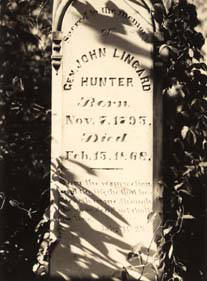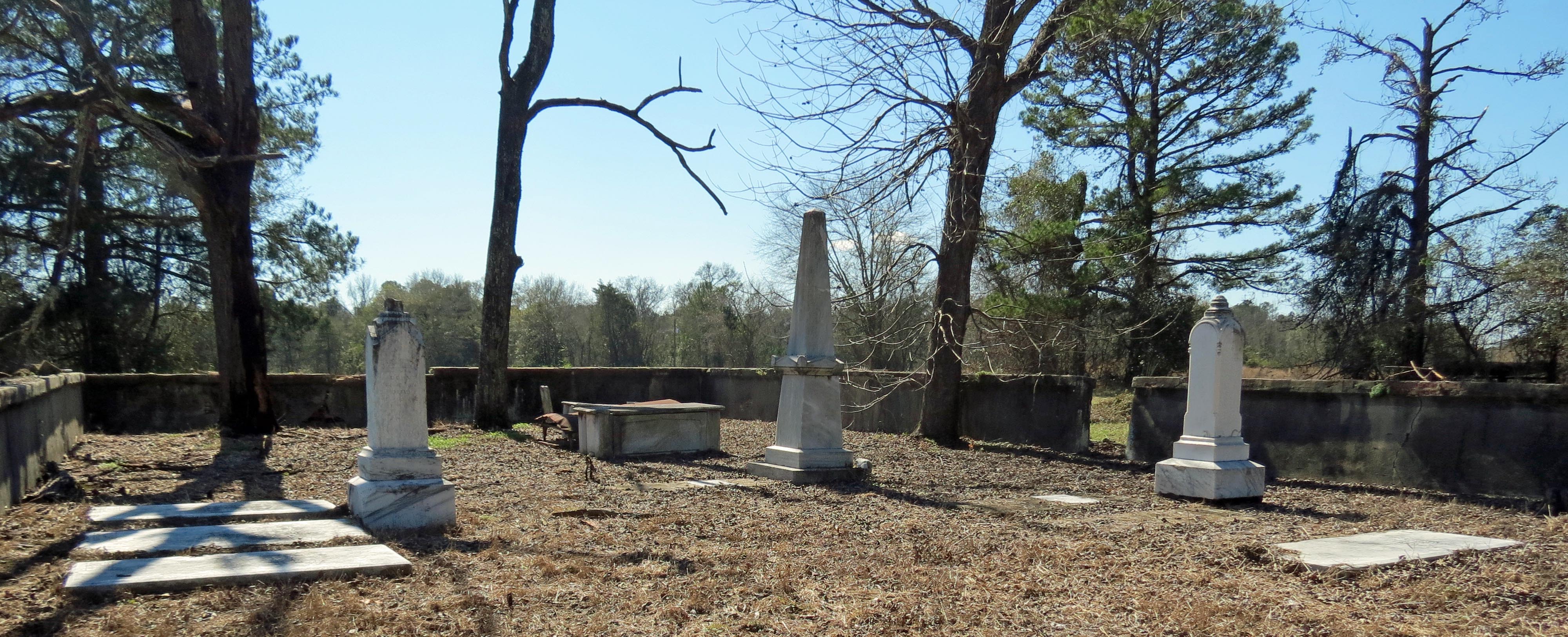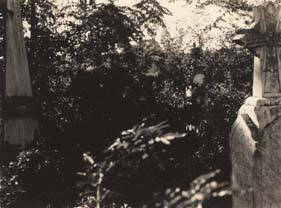John Lingard Hunter. John Lingard Hunter was born in 1795 in Charleston, South Carolina, the son of Thomas and Mary Lingard (Wyatt) Hunter. The Hunter family came originally from Scotland. John Lingard Hunter was a grandson of John and Violetta (Lingard) Wyatt of Charleston. His parents died when John Lingard was very young, and he was educated by South Carolina's Governor William Aiken's mother Henrietta Wyatt (sister of Violetta Lingard Wyatt). He graduated from South Carolina College with a Law Degree and soon married Sarah Elizabeth Ferguson Bowler (sometimes spelt Bohler) of Godfrey, South Carolina in July 1816.
Highly intelligent John Lingard Hunter was a scientific agriculturist and a leader in early Alabama farming organizations and politics [Thompson]. It is said he was a prolific journalist. His daughters and sons continued the practice of writing in their diaries and journals, lifelong habits learned from their father. Their letters, papers, and journals give a wonderful picture of life on a 1800s plantation and early Alabama culture. The photograph next to this paragraph is believed to be General Hunter. [Provided by Elizabeth Brown.]
In the 1830's the Hunter family sold their plantations in South Carolina and moved to Alabama. General Hunter was one of the earliest pioneers of Eufaula and instrumental in protecting its citizens during the Creek Indian uprisings in the 1830s. While Colonel he organized a company of volunteers which became known as the Forty-Second Regiment, Alabama Militia. Eventually he was elected Major General, Alabama Militia.
The Lewy Dorman papers give some fascinating information on the Indian Wars in Barbour County: "The Creek War was a most interesting episode in the early history of Barbour County. It began in the Spring of 1836. Some of the first white (settlers) cheated the native Creeks out of their lands, some even with help of "rogue" Indians. The Indians saw they were losing their lands in spite of the Government agents sent to prevent such actions. This discontent led to acts of violence against settlers and finally the outbreak of war."
An attack at Hobdy's Bridge in Pike County (where Lewis Pugh was killed, father of James Lawrence Pugh, who would marry a Hunter daughter) led to great alarm among the outstretched settlers in Pike and Barbour Counties (Barbour County was created in 1832 from portions of Pike County after the first Creek land cession). "In May of 1836 the fighting moved towards Irwinton (Eufaula). When Roanoke, Georgia was burned and the town people massacred, a stockade was soon built in Irwinton. Two companies of Infantry were organized and equipped at the stockade. John Lingard Hunter was appointed to command one of the infantry companies." [Dorman]
Victoria Virginia Hunter (Clayton) writes that "my father and oldest brother joined the army formed for the purpose of making the red man take up his march toward the west….my mother and children were sent up into Middle Georgia to remain while these hostilities lasted." [Clayton]
Through his leadership, General Hunter was instrument in breaking the power of the Creek Nation in Southeast Alabama. He urged the removal of the remaining Creeks and establishment of military posts to protect settlers.
After the war, General Hunter became one of the largest land owners in the county - an independently wealthy farmer. He was a trustee of the University of Alabama, and also a member of the Legislature from Barbour County. He is described by Garret as: "a fair specimen of the olden school….where the polish and grace of manner, with all the etiquette of good breeding, never forsook him." [Owen]
Married at an early age to Sarah Elizabeth Bowler (Bohler) - from this union of Bowler and Hunter a long line of descendants in Barbour County can be traced. [Wallace]
John Lingard Hunter. John Lingard Hunter was born in 1795 in Charleston, South Carolina, the son of Thomas and Mary Lingard (Wyatt) Hunter. The Hunter family came originally from Scotland. John Lingard Hunter was a grandson of John and Violetta (Lingard) Wyatt of Charleston. His parents died when John Lingard was very young, and he was educated by South Carolina's Governor William Aiken's mother Henrietta Wyatt (sister of Violetta Lingard Wyatt). He graduated from South Carolina College with a Law Degree and soon married Sarah Elizabeth Ferguson Bowler (sometimes spelt Bohler) of Godfrey, South Carolina in July 1816.
Highly intelligent John Lingard Hunter was a scientific agriculturist and a leader in early Alabama farming organizations and politics [Thompson]. It is said he was a prolific journalist. His daughters and sons continued the practice of writing in their diaries and journals, lifelong habits learned from their father. Their letters, papers, and journals give a wonderful picture of life on a 1800s plantation and early Alabama culture. The photograph next to this paragraph is believed to be General Hunter. [Provided by Elizabeth Brown.]
In the 1830's the Hunter family sold their plantations in South Carolina and moved to Alabama. General Hunter was one of the earliest pioneers of Eufaula and instrumental in protecting its citizens during the Creek Indian uprisings in the 1830s. While Colonel he organized a company of volunteers which became known as the Forty-Second Regiment, Alabama Militia. Eventually he was elected Major General, Alabama Militia.
The Lewy Dorman papers give some fascinating information on the Indian Wars in Barbour County: "The Creek War was a most interesting episode in the early history of Barbour County. It began in the Spring of 1836. Some of the first white (settlers) cheated the native Creeks out of their lands, some even with help of "rogue" Indians. The Indians saw they were losing their lands in spite of the Government agents sent to prevent such actions. This discontent led to acts of violence against settlers and finally the outbreak of war."
An attack at Hobdy's Bridge in Pike County (where Lewis Pugh was killed, father of James Lawrence Pugh, who would marry a Hunter daughter) led to great alarm among the outstretched settlers in Pike and Barbour Counties (Barbour County was created in 1832 from portions of Pike County after the first Creek land cession). "In May of 1836 the fighting moved towards Irwinton (Eufaula). When Roanoke, Georgia was burned and the town people massacred, a stockade was soon built in Irwinton. Two companies of Infantry were organized and equipped at the stockade. John Lingard Hunter was appointed to command one of the infantry companies." [Dorman]
Victoria Virginia Hunter (Clayton) writes that "my father and oldest brother joined the army formed for the purpose of making the red man take up his march toward the west….my mother and children were sent up into Middle Georgia to remain while these hostilities lasted." [Clayton]
Through his leadership, General Hunter was instrument in breaking the power of the Creek Nation in Southeast Alabama. He urged the removal of the remaining Creeks and establishment of military posts to protect settlers.
After the war, General Hunter became one of the largest land owners in the county - an independently wealthy farmer. He was a trustee of the University of Alabama, and also a member of the Legislature from Barbour County. He is described by Garret as: "a fair specimen of the olden school….where the polish and grace of manner, with all the etiquette of good breeding, never forsook him." [Owen]
Married at an early age to Sarah Elizabeth Bowler (Bohler) - from this union of Bowler and Hunter a long line of descendants in Barbour County can be traced. [Wallace]
Family Members
Advertisement
Records on Ancestry
Sponsored by Ancestry
Advertisement
